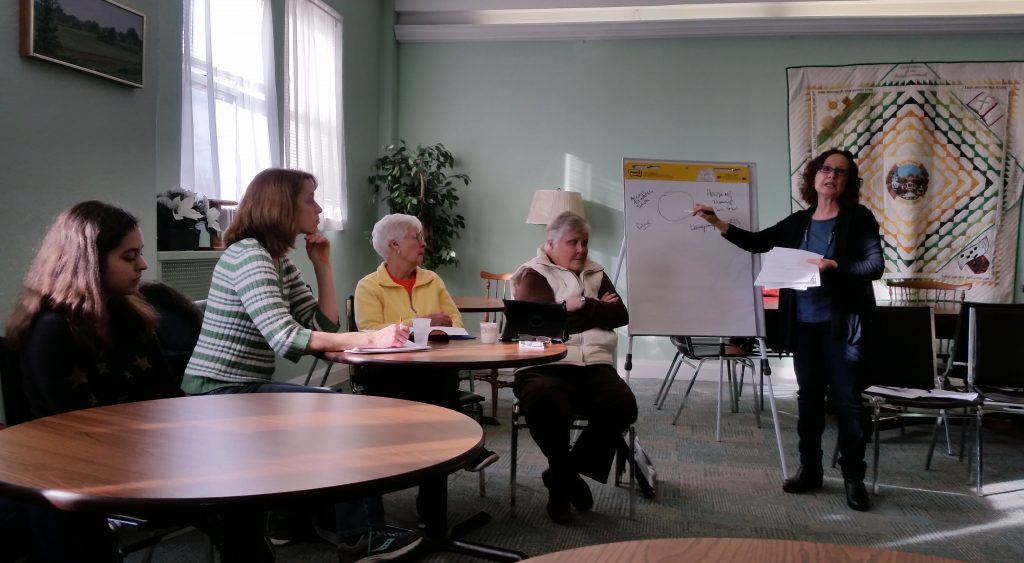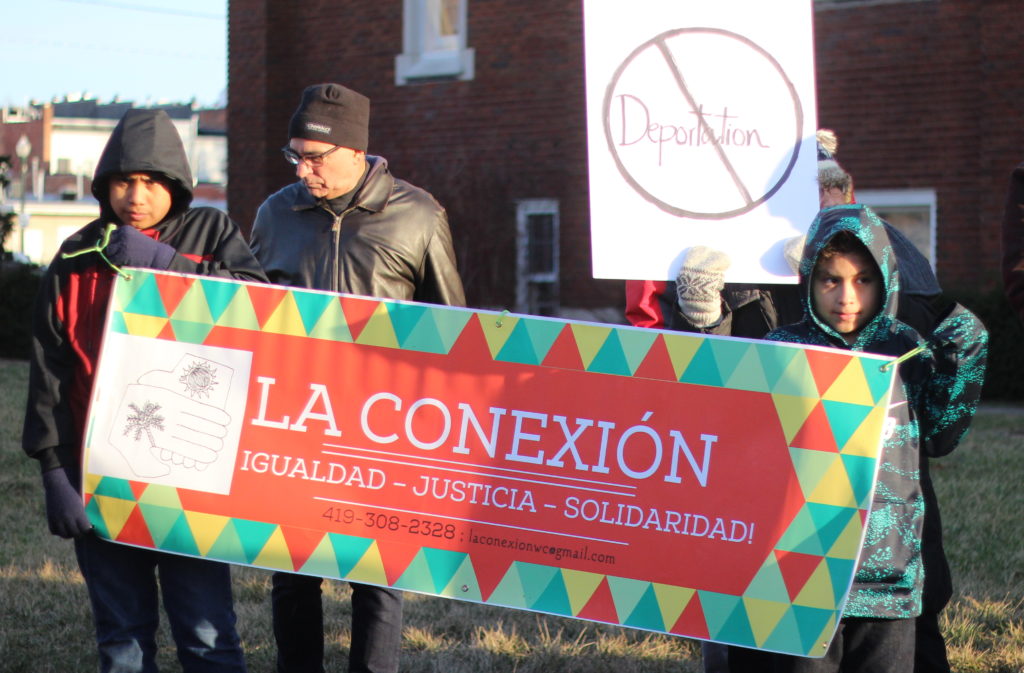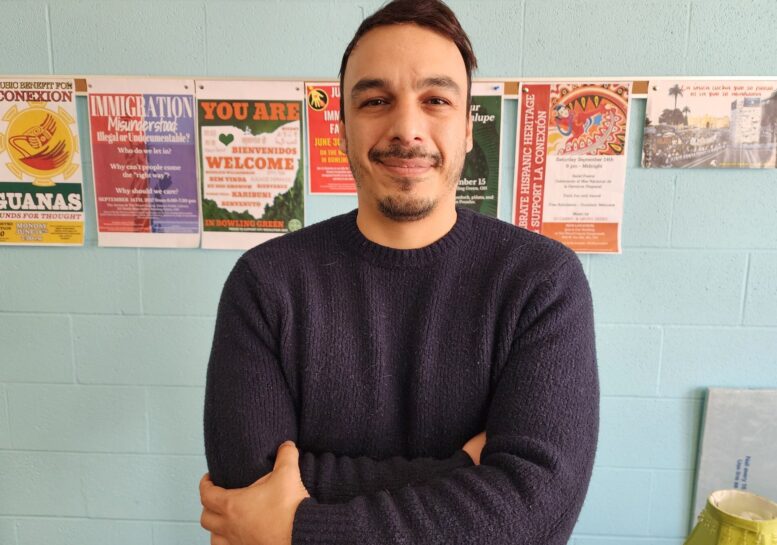By JAN LARSON McLAUGHLIN
BG Independent News
Immigrants who have lived and worked in Wood County for several years still look over their shoulders.
Families who escaped organized crime, drug cartels, and staggering unemployment in Central American countries, came here to raise children and earn money. But then, for many, a different fear surfaced.
“They always live with the fear of being deported,” said Braulio Franco, the program coordinator for La Conexión of Wood County.
(Editor’s note: This is the fifth and final piece of a series in Bowling Green Independent News on the human cost to failed immigration policies at the U.S. border with Mexico. The stories were written after a trip to asylum seeker camps in Mexico with Practice Mercy Foundation.)
Though few motorists in Wood County may notice, undocumented immigrants here are very conscious of the border patrol agents that keep an eye on roadways.
Because of the risk of being picked up by border patrol, La Conexion directs local immigrants to have power of attorney documents drawn up, so their children can stay with friends of the family here if a parent is deported.
Franco said a large number of immigrants in Wood County from Central American countries are undocumented.
“They might have a chance to fix their status,” he said. Many are on the massive waiting list at immigration courts. Others are undocumentable, meaning they have some type of criminal record or have presented false documents.
Beatriz Maya, former director of La Conexion of Wood County, who moved to Houston but still has a role as consultant with the organization, has heard estimates of 150,000 undocumented immigrants in Ohio.
In many families, the father comes first to the U.S., then sends money back to his wife and children so they can someday reunite here, Maya said. Many families live in fear of being sent back to their homelands, where jobs have evaporated and violent crime has mushroomed.
“They are mainly working people who come here to make a living – exactly like other immigrants have over the years,” Maya said.
And when they get appointments at immigration court, they show up, she added.
“People do report to court. They want to do things properly. They don’t want to jeopardize their chances,” she said.
Maya bristles when she hears people say that Central Americans wanting to come to the U.S. just have to apply the legal way.
“That’s just such a lie,” she said.
Franco, who came to the U.S. after law school in Mexico, quickly realized a need among immigrants from Central America.
“I had the feeling of wanting to help others,” he said, listing off issues of language barriers, the need for translators, lack of documentation, and help with legal issues.
Franco began doing outreach work with seasonal agricultural workers, through Northwest Ohio Advocates for Basic Legal Equality. From there, he worked with a farm labor organization in North Carolina, helping to process agricultural visas for people working in tobacco, cotton and sweet potato fields.
“We were making sure they knew their rights” to acceptable living conditions, proper pay, and workers compensation if they were injured on the job, he said.

La Conexion offers help
When Maya came to Bowling Green, she saw a gaping hole in services for immigrant services.
“My goal was to work with the Latino community. The Latino population was growing in the rural areas,” yet there were few services in the region between Toledo and Dayton, she said. “When you arrive, you are desperate to find a connection. People had nowhere to go.”
Furthering his goal of helping people in their new country, Franco began working with La Conexion of Wood County earlier this year. As program director, he has been focusing on language access, including interpretation services at schools, with police and at hospitals for Spanish speaking residents.
La Conexion offers English as a Second Language courses and tutoring.
“Adults can come with their kids,” Franco said.
Recently more Venezuelans, trying to escape violence and find employment, have been arriving in Wood County.
“We are trying to help them,” Franco said. “But all the information they receive is in English.”
Making matters more difficult is the hateful rhetoric continuing to be used by former President Trump, describing immigrants from the south as murderers, rapists and drug dealers.
“That affects a lot. It’s a hate campaign against immigrants,” Franco said. “People believe what he is saying. That makes us even more cautious.”
At the same time, brown immigrants are frequently victims of discrimination and have problems finding housing because they have no credit history.
Franco has heard the allegations that immigrants are taking good paying jobs away from Americans.
“There’s a lot of misinformation,” he said. “It’s not like they are stealing any jobs.”
Very few U.S. citizens are interested in jobs requiring eight to nine hours a day in hot sun, doing back-breaking work, with “deplorable” living conditions, Franco said.
“I haven’t seen many people from here working in the fields,” he said.
Farm labor leader Baldemar Velasquez has also heard the arguments about Mexican workers taking jobs from American citizens. “If you’re good enough, you’ll get the job,” he said while speaking in Bowling Green in 2017. “Why are you afraid of competition from a bunch of uneducated Mexicans?”
To be frank, jobs picking pickles and tomatoes don’t really seem to attract many white applicants, Velasquez said. While many Americans are driving by in their air-conditioned cars on 90 degree days, “these folks are over there, stooping over” and picking from sunrise to sunset in the blistering sun.
The Mexicans taking the risk to be in the U.S. just want to work, Velasquez said. “Allow us to work without looking for immigration over our shoulders.”

Detained by ICE
Over the years, La Conexion has been asked to help when local undocumented immigrants are picked up by border patrol. Back in 2018, Maya shared the story of a local man turned over to Immigration and Customs Enforcement following a traffic violation in northern Wood County.
The man had been in the U.S. for nearly 14 years, had worked as a skilled tradesman in the Bowling Green community for more than seven years and had no criminal history. He had a wife and three young children, with the children being U.S. citizens.
The BG man had been held in an ICE facility in Michigan for 25 days after being picked up for speeding north of Bowling Green.
“They found he’s not a criminal of any sort. He was very, very emotional,” Maya said, recalling their conversation when he was released to come home.
“I didn’t know what was going to happen. I wasn’t sure if I was going to see my family again,” Maya said the man stated on the ride back to BG.
Once they pulled up at his home, his family raced to welcome him back. “It was very emotional. The kids were running to hug him,” Maya said.
Also in 2018, a traffic stop landed another Bowling Green man in jail, with the next stop likely deportation back to Mexico for being an undocumented immigrant.
He left behind three children who are U.S. citizens, a wife who had just been diagnosed with Lupus, and a local employer who was unlikely to find a documented American to take his place in the fields.
His situation was different, in that he was deported once before, also after being stopped while driving. He had returned to the U.S. because he had a wife and three young children, and the area he came from in Mexico was extremely dangerous, especially for those deported from the U.S.
“He needed to come back. He had three kids and a wife to support,” Maya said.
“We are losing a hardworking person, who is honest and never took anything,” Maya said. The family has lost its breadwinner, and the farmer has lost a worker. “Who’s winning?”
The father first came to the U.S. in 1996 to pick crops in Florida. Starting in 2002, he began migrating between Ohio and Florida to hit harvest seasons. At age 38, he had picked oranges, apples, strawberries, cucumbers and pumpkins, his wife said.
Known as a hard worker, the man started picking crops on a large farm in Wood County, then changed jobs to work at a local dairy which meant year-round work so their children did not have to move during the school year. His latest job was working at an area orchard.
It’s unknown if the man was ever reunited with his family.

Dreams dashed
During a 2021 panel discussion in Bowling Green, Karla Mendoza, a local immigration advocate, spoke about the mental health strain of being undocumented. She was a “dreamer,” a child brought to the U.S. who remained undocumented.
Mendoza’s father immigrated to the U.S. in 2000, first to Washington, D.C., and then the next year to Toledo, where he had family. “He found community. He found friends,” she said.
A chemical engineer, pastor and musician, he came to escape the economic hardship in Peru. A year later Mendoza along with her mother and sister joined him.
“Because of misinformation, my parents quickly became undocumented, and I became undocumented,” she said.
Mendoza learned English quickly, and was a top student. By the time she graduated from high school, she had two years of college credits. “So I was what the dominant culture would call ‘the model immigrant.’”
Yet she couldn’t go to college. She couldn’t get a driver’s license. She couldn’t get a job.
She spent her formative years hiding. That’s all she could do until 2012 when the Obama Administration unveiled the DACA (Deferred Action for Childhood Arrivals) Program that gave her at least temporary status.
Then the Trump Administration moved to cancel DACA, and Mendoza said she lived in fear of being stopped by the police.
She said she had not seen her mother in five years. Her mother had to return to Peru to take care of Mendoza’s grandmother, whom Mendoza hadn’t seen in 20 years. Her mother could not return to the U.S., and Mendoza could leave knowing she would not be allowed to return.
This separation “is the worst thing I’ve ever experienced.”
Many “dreamers” remain in legal limbo. According to the Department of Homeland Security, the U.S. District Court for the Southern District of Texas on Sept. 13, 2023, issued a decision finding DACA unlawful. The district court, however, maintained a partial stay of the order for “all DACA recipients who received their initial DACA status prior to July 16, 2021.”





